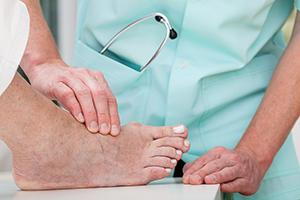A bunion is a commonly acquired foot deformity in which the big toe turns toward the second toe. Termed Hallux Valgus in the medical  community, bunions also features a substantial bump on the inside of the foot, often causing pain and discomfort. Fortunately, your foot doctor in Fairfield County, Dr. Peter Siroka, treats dozens of bunions, most of them through conservative means. However, some people with more serious bunion conditions need surgical intervention. Read on to learn more about this treatment (termed bunionectomy) and what it can do for you.
community, bunions also features a substantial bump on the inside of the foot, often causing pain and discomfort. Fortunately, your foot doctor in Fairfield County, Dr. Peter Siroka, treats dozens of bunions, most of them through conservative means. However, some people with more serious bunion conditions need surgical intervention. Read on to learn more about this treatment (termed bunionectomy) and what it can do for you.
How bunions happen
Heredity plays a large role in bunion formation. If your mother or grandmother had bunions, you will likely develop them, too, due to inherited foot structure. Add age (over 40), injury, overuse, and high-heeled, narrow-toed shoes, and you have the perfect blueprint for Hallux Valgus.
Treating bunions
With milder bunions, simply wearing wider, roomier often shoes reduces the pain and swelling—even stopping the progression of the deformity. Shoe orthotics can also correct any gait issues, decrease friction, and reduce callus/corn formation. Rest, ice, and over the counter pain relievers ease symptoms, too.
Bunion surgeries
However, some bunions are complex and require surgery. Called a bunionectomy, this podiatric procedure aims to remove the bony bump and straighten the big toe. Sometimes, the doctor fuses the big toe joint.
In general, our Fairfield County office performs two kinds of bunionectomies: head surgeries and base procedures. A head surgery involves removing the bony bump and re-aligning and pinning the big toe so it is straight. A base procedure addresses more complicated bunions--both the bones and the controlling tendons and ligaments of the foot. Dr. Siroka often uses the innovative Merette Locking Plate for bunions which require fusion of the big toe.
The details of your case determine both the extent of your surgery and your recovery protocol. All treatments involve some suturing. Simpler procedures happen in the office with local anesthesia while more involved surgeries occur in the local hospital with the benefit of twilight sedation or general anesthesia.
Don't prolong the pain and deformity. Call our foot doctor today
Halt the progress of your bunion with caring and accurate treatment from the most qualified foot doctor in Fairfield County—Dr. Peter Siroka. Call today for your one-on-one consultation: (203) 614-8185 .

